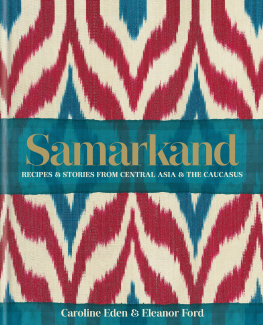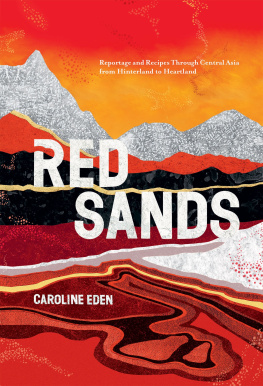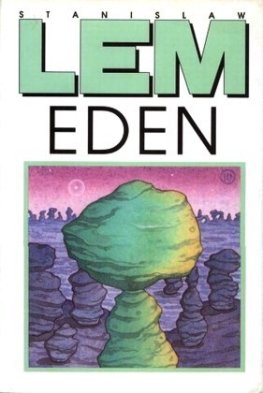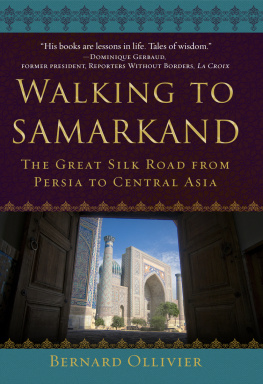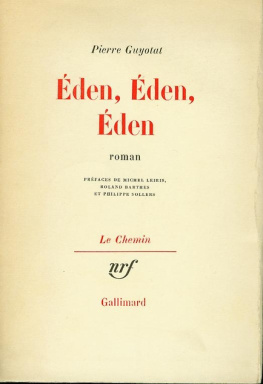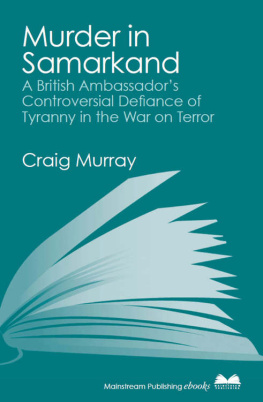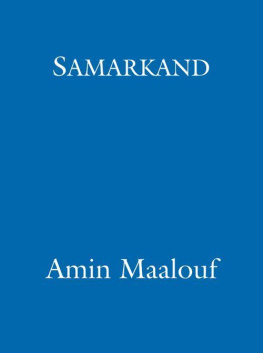Caroline Eden - Samarkand
Here you can read online Caroline Eden - Samarkand full text of the book (entire story) in english for free. Download pdf and epub, get meaning, cover and reviews about this ebook. year: 2021, publisher: Octopus, genre: Home and family. Description of the work, (preface) as well as reviews are available. Best literature library LitArk.com created for fans of good reading and offers a wide selection of genres:
Romance novel
Science fiction
Adventure
Detective
Science
History
Home and family
Prose
Art
Politics
Computer
Non-fiction
Religion
Business
Children
Humor
Choose a favorite category and find really read worthwhile books. Enjoy immersion in the world of imagination, feel the emotions of the characters or learn something new for yourself, make an fascinating discovery.
- Book:Samarkand
- Author:
- Publisher:Octopus
- Genre:
- Year:2021
- Rating:3 / 5
- Favourites:Add to favourites
- Your mark:
- 60
- 1
- 2
- 3
- 4
- 5
Samarkand: summary, description and annotation
We offer to read an annotation, description, summary or preface (depends on what the author of the book "Samarkand" wrote himself). If you haven't found the necessary information about the book — write in the comments, we will try to find it.
Samarkand — read online for free the complete book (whole text) full work
Below is the text of the book, divided by pages. System saving the place of the last page read, allows you to conveniently read the book "Samarkand" online for free, without having to search again every time where you left off. Put a bookmark, and you can go to the page where you finished reading at any time.
Font size:
Interval:
Bookmark:



Caroline Eden is a writer contributing to the travel, food and arts pages of the Guardian, Financial Times and the Times Literary Supplement. For BBC Radio 4s From Our Own Correspondent she has recorded stories from Kyrgyzstan, Kazakhstan, Uzbekistan, Azerbaijan and Russia. She is also the author of three other books focusing on the former Soviet Union and the Turkic-speaking world, Black Sea (Quadrille, 2018), Red Sands (Quadrille, 2020) and The Land of the Anka Bird (Cornucopia Books, 2020).
carolineeden.com; Twitter and Instagram: @edentravels
Eleanor Ford writes about food, travel and recipes. She is also the author of Fire Islands: Recipes from Indonesia (Murdoch Books, 2019). Her writing has won awards from the Guild of Food Writers, Gourmand World Cookbook Awards and the Edward Stanford Travel Writing Awards.
eleanorfordfood.com; Instagram: @eleanorfordfood

In all other parts of the world light descends upon earth. From holy Samarkand and Bukhara, it ascends. Local saying
For centuries the fabled city Samarkand has been a magnet for merchants, travellers and conquerors. Its name resonates like those of only a handful of other ancient cities, perhaps Babylon, Rome or Jerusalem. Say it out loud and it rolls off the tongue: Samarkand. It is seductive.
Set in the valley of the Zerafshan River in Uzbekistan, this turquoise oasis still beguiles modern-day visitors following in the footsteps of Alexander the Great and the mighty Tamerlane. Reflecting its past as a cultural crossroads, this Silk Road stopover has buildings, gardens, fountains and other cultural treasures whose extraordinary beauty and achievement inspired Islamic architecture across the entire region from the Mediterranean to India. Sky-blue mosques and sand-coloured minarets, fluted domes, madrasas and monumental mausoleums, their ceramic-tiled and mosaic surfaces dazzling with floral motifs and geometric patterns the effect is as dizzying and utterly compelling as a mirage in the desert.
For hundreds of years the journey to Samarkand necessitated a Herculean effort. Arduous expeditions, carrying goods between far-off cities like Xian and Shiraz, made the trek on two-humped Bactrian camels over endless steppe, through inhospitable mountains and across shifting sands like the Taklamakan Desert, a parched expanse roughly the size of Italy.
Why? What made men endure scorching heat, numbing cold and howling winds, losing their minds and lives in a bid to reach Samarkand, hidden behind a barricade of mountain, grasslands and sand? The answer is trade, because from the sixth to the thirteenth centuries Samarkand experienced an age of unmatched prosperity. It became Asias great shop window, one of the worlds finest market-places, where everything from rare spices to yak-tail fly whisks were bartered and sold.
Throughout the centuries the wealth of Samarkand has been legendary. Merchants sought bags of rice and carrots from the Himalayas, cuts of sugar cane, bundles of lemons, plaits of garlic and sacks of soy beans from eastern Asia. Exchange on the Silk Road travelled in both directions too. From the west towards China went cucumbers, coloured glass and wine grapes. Historian Edward H. Schafer, in his gorgeously titled book The Golden Peaches of Samarkand, describes how fancy yellow peaches, large as goose eggs were formally gifted to Chinas Tang empire in the seventh century, symbolising all the exotic things longed for.
Traders found safety in Samarkand in the form of shelter, dealers and brokers. Mercenaries too could be hired for the onward journey to fend off slave raiders and bandits. Long after the merchants had departed their goods and traditions stayed on in this oasis. Sogdian the language of Samarkands middlemen became the language of the commercial world. Melting pot is a somewhat exhausted metaphor but it describes Samarkand perfectly. This is a city that has been at the crossroads of food culture for centuries.
Modern-day Samarkand is no longer the mythical place it once was but the journey to this incredible city is always an exciting one.
It was on such a journey that I decided to write this book. The idea was to bring together the cuisines of seven ethnic groups who had left their mark on Samarkand over the centuries the Tajiks, Russians, Turks, Jews, Koreans, Caucasians and the Uzbeks themselves.
Tajiks have lived in Samarkand and Bukhara for centuries and large numbers still do. In mountainous Tajikistan itself, bordered by Kyrgyzstan to the north, Uzbekistan to the northwest, Afghanistan to the south and China to the east, their cuisine displays a mix of Russian, Uzbek and perfumed rice dishes, reflecting Persian roots.
A sizeable population of ethnic Russians continues to live in post-Soviet Central Asia. Smoke and brine traditionally used to preserve food in Russia infuse the air in homes and restaurants. Sweet earthy borsht and piroshky (fried buns stuffed with potatoes and meat) are ever-present in markets and cafs. Another hangover from the Soviet era is a passion for vodka. Despite their Islamic heritage, many Central Asians enjoy a drink and any new visitor will quickly learn that local hospitality combined with the firepower of a few shots can pack a mean punch (and hangover).
Turks have traded and lived in the region for centuries and Turkish cuisine is imitated and admired across Central Asia. The seventeenth-century Ottoman traveller and diarist Evliya elebi described dishes that were prepared for Ottoman Pashas, which chime with the cuisine of Central Asia today: saffron, ilav (boiled rice), roasted meats, mulberry meatballs, pistachio, almond, raisin pilafs of partridge, pomegranate and soups. Nowadays, popular Turkish restaurants in the Central Asian region tend to serve pides, mutton casseroles, spitted and grilled lamb, while kebab varieties run into the dozens.
There are Jews living in Bukhara and Samarkand who claim to be direct descendants of the ten lost tribes of Israel, although historians suggest it is more likely that they arrived at the behest of the fearsome tribal leader, Tamerlane. As he blazed a trail through Asia in the fourteenth century, he brought Jewish dyers and weavers from the Middle East back to his splendid blue-tiled city of Samarkand. Over time, oppressive leadership and the collapse of the Soviet Union meant that these Jews became one of the most detached Jewish communities in the world. Through it all, many culinary traditions were guarded and preserved, even though today, only around a thousand Jews remain in Uzbekistan. Uzbek Jewish cuisine is a co-mingling of Persias vegetable-studded pilafs and Russias heavy meat dishes. It is characterised by light spices a little cumin, coriander, turmeric, pepper and chilli and delicate flavours intensified by herbs, onion and garlic.
Font size:
Interval:
Bookmark:
Similar books «Samarkand»
Look at similar books to Samarkand. We have selected literature similar in name and meaning in the hope of providing readers with more options to find new, interesting, not yet read works.
Discussion, reviews of the book Samarkand and just readers' own opinions. Leave your comments, write what you think about the work, its meaning or the main characters. Specify what exactly you liked and what you didn't like, and why you think so.

